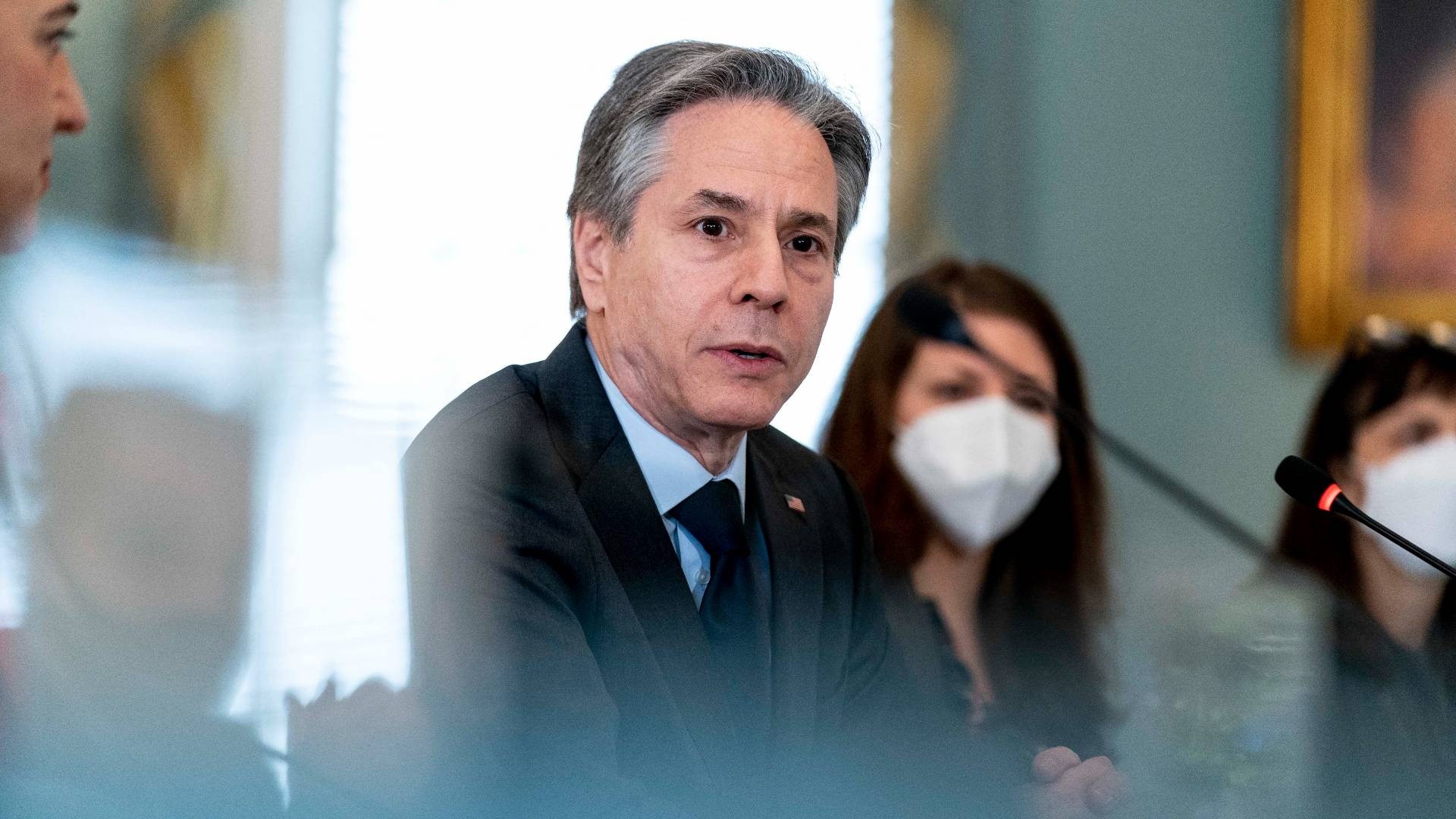Human rights and democracy eroding among US allies in Middle East, report says

The US State Department has said respect for human rights and democratic norms have continued to worsen across the Middle East, with authoritarian states, including Washington's allies in the region, detaining opponents and activists seen as posing a threat to their rule.
Secretary of State Antony Blinken described what he called a continued "recession" in basic rights and the rule of law over the past year, as he unveiled the US government's annual assessment of the global human rights situation on Tuesday.
"Governments are growing more brazen, reaching across borders to threaten and attack critics," Blinken said, as he cited an alleged effort by Iran's government to abduct an Iranian-American journalist from New York.
The report also laid out a litany of alleged abuses by both allies and rivals, including forced disappearances in Qatar, Saudi Arabia and the United Arab Emirates.
Because the report is focused on trends in 2021, it did not explicitly address Russia’s ongoing invasion of Ukraine.
Stay informed with MEE's newsletters
Sign up to get the latest alerts, insights and analysis, starting with Turkey Unpacked
"In his remarks accompanying the report, Secretary Blinken said the 'United States will continue to support those around the world struggling for human dignity and liberty'," said Sarah Leah Whitson, executive director of Democracy for the Arab World Now (Dawn).
"It is hard to square this statement with the US government aiding and arming some of the worst human rights abusing governments in the world.
"The real question we should be asking is why is the US government ignoring its own evidence and laws to continue supporting some of the most abusive governments in the world."
Sarah Yager, the Washington director at Human Rights Watch, welcomed the report but said it failed to highlight the US's role in conflicts where civilians have suffered widespread harm, including Yemen.
"Always a little odd to read about other’s human rights abuses as if US had nothing to do with them. e.g. no mention of US support to Saudi [Arabia] in Yemen but the #HumanRightsReport discusses Iran support to Houthis," she said on Twitter. "No mention of US in Afghanistan or civilian harm caused in Kabul."
Egypt, Morocco and Tunisia
According to the State Department's report, Egyptian authorities were responsible in 2021 for unlawful or arbitrary killings; torture and inhuman treatment; harsh and life-threatening prison conditions; politically motivated reprisals against individuals located in another country; and serious restrictions on the internet and press freedom.
"In most cases, the government did not comprehensively investigate allegations of human rights abuses, including most incidents of violence by security forces, contributing to an environment of impunity," the report said.
Egypt is the second-largest recipient of US military aid, receiving roughly $1.3bn a year for the country's security and defence needs.
Since assuming power in a 2013 military coup, President Abdel Fattah el-Sisi has embarked on a wide-ranging campaign to curb dissent, including the arrests of at least 60,000 political dissidents, according to rights groups.
John Hursh, a programme director at Dawn, said Congress should "remember these findings from the State Department when the Egyptian government asks for another $1.3bn in military support from US taxpayers.
"US hypocrisy ignoring Egypt's record is exactly what autocrats such as Russian President Vladimir Putin point to and use to dampen international support for the United States in its stand against Russia over its aggression and invasion of Ukraine."
On Morocco, the report mentioned claims of torture and arbitrary killings as well as the surveillance of political activists.
It said the government had taken steps to "investigate officials who allegedly committed human rights abuses and acts of corruption, but investigations into police, security force, and detention center abuses lacked transparency and frequently encountered long delays and procedural obstacles that contributed to impunity".
In recent years, Morocco has been able to retain a multi-billion dollar deal to purchase F-16 fighter jets.
The report refrained from taking a position over the disputed Western Sahara area, a source of a decades-long conflict between Morocco and the Sahrawi independence movement.
On Tunisia, the report said authorities had committed significant human rights abuses since President Kais Saied's July 2021 powergrab, including reports of torture; arbitrary arrests or detentions; the use of military courts to investigate civilian cases; serious restrictions on freedom of expression and media; and the worst forms of child labour.
In recent weeks, a number of House Democrats have called on the White House to consider Tunisia's "democratic backsliding" when reviewing financial assistance for the upcoming fiscal year.
Gulf countries
The State Department's report also had a lot to say about the human rights situations in a number of Gulf countries, including Bahrain, Qatar, Saudi Arabia and the United Arab Emirates.
On Bahrain, the administration highlighted cases of torture, life-threatening prison conditions, the jailing of political dissidents, and serious media restrictions.
Bahrain is home to the headquarters of the US Navy's 5th Fleet, and as of January 2021, had $5.8bn in active government-to-government sales cases with the US.
The State Department said that Qatar, which was recently designated as a major non-Nato ally, had restricted free expression, imposed restrictions on migrant workers’ freedom of movement, as well as serious restrictions on political participation.
The most significant amount of rights abuses, however, were found in Saudi Arabia, which just last month executed 81 people in a single day, the largest number in recent history.
The State Department's report also included: forced disappearances; torture; arbitrary arrest and detention; serious restrictions on free expression and media; and civilian casualties as a result of air strikes in Yemen.
It also noted the harassment and intimidation of Saudi dissidents living abroad.
Last month, a group of House Democrats issued a probe into whether countries that receive US weapons are involved in targeting dissidents on American soil. They cited a US law that prohibits Washington from selling arms to nations that show a "consistent pattern of acts of intimidation or harassment directed against individuals in the United States".
"The harassment and intimidation of Saudi dissidents living abroad—just one example of the magnitude of repression from the Saudi government - is incompatible with the American values that State Department officials champion as a key part of US foreign policy," Hursh said.
The State Department report also mentioned a number of claims of arbitrary detention and torture in the United Arab Emirates.
The US already warns those travelling to the UAE that authorities there are sensitive to content posted on Facebook, Twitter and YouTube.
The country has come under fire from Amnesty International after it was reported that Israel's Pegasus spyware was used by the UAE to spy on international journalists, activists and world leaders.
Israel and Palestine
The human rights reports section highlighted significant human rights issues including credible reports of unlawful or arbitrary killings, extraterritorial detention of Palestinians from the occupied territories in Israel, harassment of nongovernmental organisations and restrictions on Palestinians residing in Jerusalem, including arbitrary or unlawful interference with privacy, family, and home.
Israel illegally occupied East Jerusalem in the 1967 war in defiance of the international community, claiming it as a part of Israel.
The overwhelming majority of East Jerusalem's 340,000 Palestinians identify as Palestinians and have long sought the city's east as the capital of a future state.
In recent years, a small but growing number of lawmakers have sought to rein in funding to Israel, including Congresswoman Betty McCollum, who introduced a bill that would ensure that US military assistance was not used to fund abuses against Palestinians, including the imprisonment of children and home demolitions.
Still, the US has continued to staunchly support Israel despite reports by Human Rights Watch and Amnesty International, among others, calling Israel's treatment of Palestinian "apartheid".
"The State Department failed to address the findings of the crimes of apartheid and persecution by Israeli, Palestinian, and international NGOs, and the UN Special Rapporteur on the human rights situation in Palestine, even as it noted apartheid conditions, such as prosecuting Palestinians held in Israel who are not Israeli citizens under Israeli military law," Whitson said.
"In stark contrast, the State Department concluded that Israel does not prosecute Israeli citizens that commit similar crimes in the West Bank under Israeli law."
Middle East Eye delivers independent and unrivalled coverage and analysis of the Middle East, North Africa and beyond. To learn more about republishing this content and the associated fees, please fill out this form. More about MEE can be found here.







